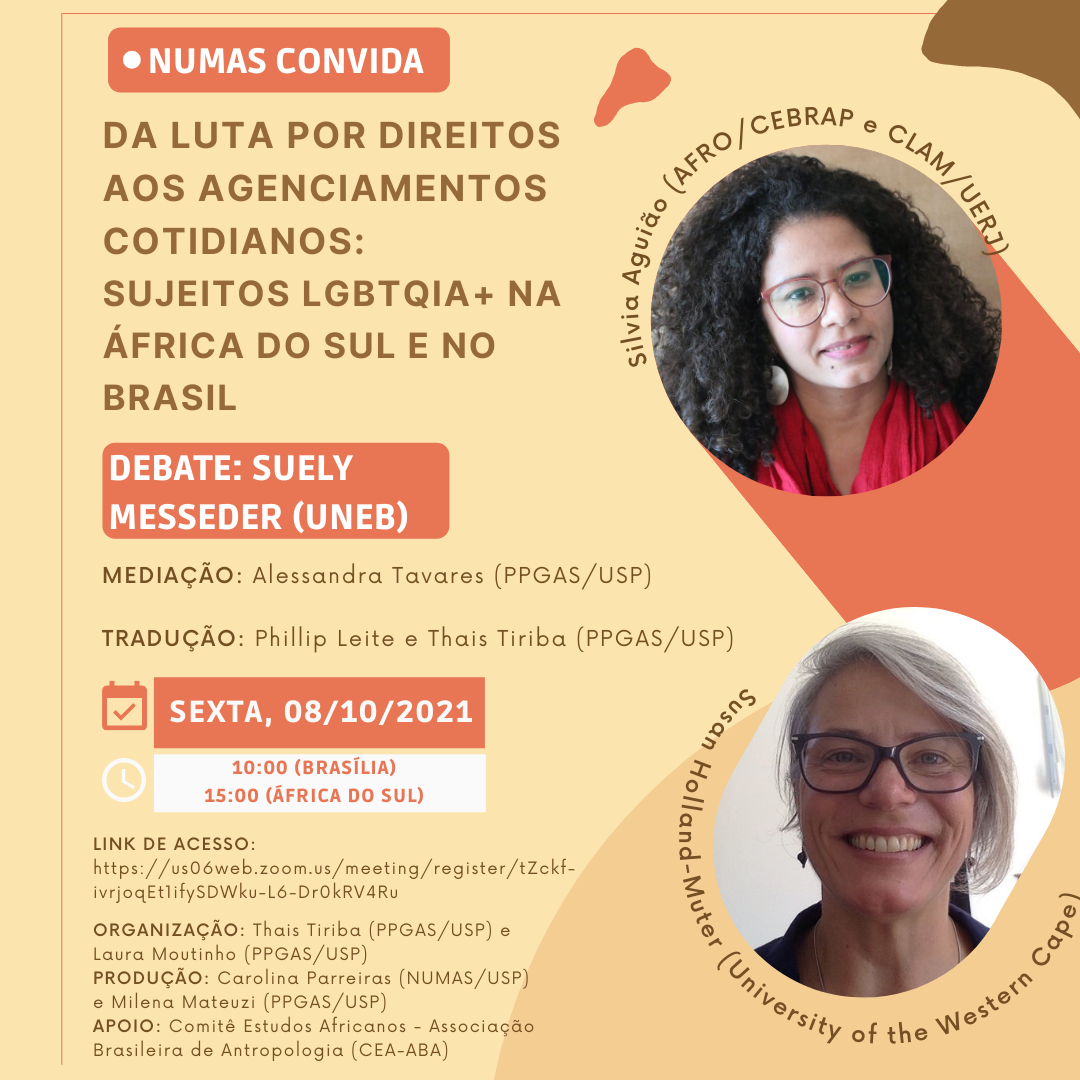The Center for Studies on Social Markers of Difference (NUMAS/USP) presents:
From the struggle for rights to everyday agencies: LGBTQIA+ subjects in South Africa and Brazil
Silvia Aguião (AFRO/CEBRAP and CLAM/UERJ)
Susan Holland-Muter (University of the Western Cape)
Debate: Suely Messeder (UNEB)
Mediation: Alessandra Tavares (PPGAS/USP)
Translation: Phillip Leite and Thais Tiriba (PPGAS/USP)
Friday, October 8th, 2021
10am (Brasília)
3pm (South Africa)
Subscription Link: https://us06web.
ORGANIZATION: Thais Tiriba (PPGAS/USP) and Laura Moutinho (PPGAS/USP)
PRODUCTION: Carolina Parreiras (NUMAS/USP) and Milena Mateuzi (PPGAS/USP)
SUPPORT: African Studies Committee - Brazilian Association of Anthropology (CEA-ABA)
Building spaces of belonging: queer lesbians in Cape Town
Susan Holland-Muter
Abstract: Two dominant and contrasting narratives characterize public discourse on queer sexualities in Cape Town. On the one hand, the city is considered the gay capital of South Africa, a place that promises opportunities, well-being and belonging. Cape Town, on the other hand, is also known for being a city of strong racialized contrasts, with queer experience materialized in places of racialized (in)security, zones of pleasure and danger in a bifurcated lens of rich zones/township, safety and danger . This presentation will explore narratives of the everyday lives of queer women and lesbians in Cape Town. Interviews with lesbians from my doctoral study will be explored through their counter-narratives, which reveal how they actively "make" Cape Town a home from within and in relation to racialized and class heteronormativities. Navigating Cape Town's everyday/night space reveals the specific and focused lesbian way of occupying and inhabiting the city. Their queer lifeworlds overlap, complement and contradict the city's official 'Pink Maps' and rework the meaning of the representation of Cape Town as the gay capital of South Africa. These gray out the racialized binary of security and territorial danger and produce moods of lesbian home constructions, notably embodied lesbian modes; homonormativity and borders. These counter-narratives reveal queer lesbian lifeworlds that are ephemeral, contingent and fractured, making known hybrid, contrasting, and alternative narratives of the city.
Susan Holland-Muter holds a Ph.D. in Humanities from the Department of Sociology at the University of Cape Town in South Africa. She has been actively participating in social movements of women and LGBTI people in South Africa and Colombia, and working as a researcher, teacher and public policy advocate in the areas of gender and sexuality policies. Her publications include a focus on lesbian motherhood, families and queer kinship, as well as the politics of lesbian spatialities in everyday life. She is the author of Outside of the Safety Zone: An agenda for research on violence against lesbian and gender non-conforming women in South Africa. He currently teaches in the Department of Sociology at the University of the Western Cape.
Notes on a trajectory of research on sexuality, gender, race and government policy in Brazil
Silvia Aguião
Abstract: The presentation exposes some ethnographic elements of research carried out between 2003 and 2016, regarding the constitution of the field of “LGBT” rights and the “promotion of gender and race equality” at the Brazilian government level. The objective is to reflect on the relationship between the research questions, the sociopolitical context of the period and the theoretical-methodological perspectives adopted in the investigations.
Silvia Aguião holds a Ph.D. in Social Sciences from the State University of Campinas, a Masters in Public Health from the Institute of Social Medicine/UERJ and a degree in Social Sciences from the State University of Rio de Janeiro. Performed post-doctoral internships at the Brazilian Center for Analysis and Planning (CEBRAP) and at the Graduate Program in Psychology at the Federal University of Maranhão (PPGPI/UFMA). She is currently a research associate at AFRO - Center for Research and Training in Race, Gender and Racial Justice (AFRO/CEBRAP) and at the Latin American Center for Sexuality and Human Rights (CLAM/UERJ). It operates and conducts research in the areas of sexuality, gender and race in its interfaces with sociability, policies and rights, social movements and State processes. She is the editor of Sexualidad, Salud y Sociedad - Revista Latinoamericana and author of the book Doing yourself in the State. An ethnography on the process of constitution of the 'LGBT' as subjects of rights in contemporary Brazil (Eduerj, 2018).
Suely Messeder - debater
Suely Messeder has a degree in Social Sciences from the Federal University of Bahia (UFBA), a Masters degree from the Postgraduate Program in Social Sciences at UFBA and a Ph.D. in Anthropology from the University Santiago de Compostela, validated in Brazil by the Postgraduate Program in Anthropology - UFBA She is a full professor at the University of the State of Bahia - UNEB. She was coordinator of the Multi-institutional and Multidisciplinary Doctorate in Dissemination of Knowledge and permanent professor of the Graduate Program in Cultural Criticism at Campus II - Alagoinhas. She is the coordinator of the Enlace Research Group and was the first secretariat of the ABEH (Brazilian Association of Homoculture Studies) during the 2010-2012 administration. She was manager of the Technical Cooperation Agreement between the Public Ministry and the State University of Bahia. He is currently a member of the Basic Advisory and Technical Assessment Chamber at FAPESB. Her interests in teaching, research and extension are in the areas of sexualities, masculinities, gender relations, body, ethnic-racial relations, knowledge management and dissemination, social entrepreneurship, social technology and Bahia.


